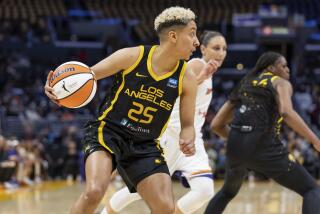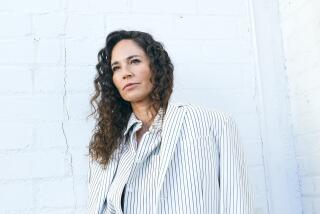After Her Life Stopped
- Share via
Like most young adults, Kayla Burt rarely thought about dying. Mortality isn’t often a topic for a 20-year-old sophomore playing basketball at the University of Washington.
But as a 22-year-old junior, Burt thinks different.
That’s because two years ago -- Dec. 31, 2002, to be exact -- Burt’s heart stopped beating.
She was lucky. She was in her apartment at the time, surrounded by five teammates. They were watching a rented movie and planning to go to bed early because of an early practice the next day.
When her friends discovered that Burt wasn’t breathing, they called 911 and applied CPR as best they could. Paramedics arrived and took Burt to a hospital, where she spent 15 hours in a coma.
When she awoke, she groggily asked what time practice was. She was told what had happened -- and that her basketball career was over.
Yet here she is, back on the court, playing with a defibrillator in her chest to monitor her heartbeat and keep it from stopping again.
Burt calls her recovery and comeback a miracle. She can’t remember anything about the night she was clinically dead for two minutes. She believes her life was spared for reasons she may not know yet.
“I still don’t know what’s wrong or why it happened ... but it’s a good feeling,” Burt said during a telephone interview. “You want to know the reason why it happened but for me, it’s not better knowing.
“I feel like God made it clear a door was opened to me for a reason. I do feel like it’s been a healing thing and a miracle was worked.”
Burt was originally diagnosed with Long QT syndrome, an abnormality in the heart’s electrical system. If that diagnosis had stood, basketball would have been ruled out and she might have been unable to bear children.
But follow-up examinations ruled that out, and Burt’s doctors have not determined another medical explanation.
“Since the doctors have not found anything, they think it’s a fluke,” Burt said.
After her release from the hospital, she sat on the bench in street clothes and watched the team play for nearly two seasons. Burt still went to the gym to exercise and play recreationally, but she missed the competition of Division I, even though she understood the folly of risking her life if her heart was indeed too fragile. Last August, however, she was medically cleared to rejoin the Huskies.
“That day, at first it didn’t seem real,” Burt said. “After sitting nearly two years, you think you’ll never play. Initially it seemed an impossible door to open. So my emotions were high.”
The decision to return was not made lightly, she said. She had to sign waivers absolving the university of liability. She also had to convince her parents, Ken and Teri.
“They were apprehensive at first,” Burt said. “Of course they saw me at my worst, not knowing if I would wake up from the coma.
“But it was not an overnight decision, but a long thought-out process. If I were risking my life I would not be playing.”
Burt has played in 21 games -- Washington plays at UCLA Thursday night and USC at the Sports Arena on Saturday afternoon -- starting in 15. Her averages of 24 minutes and 9.2 points are second-highest on a young team that lists a combined 12 freshmen and sophomores on the roster.
Coach June Daugherty has tried hard to treat Burt as just another player, but it’s not easy. Daugherty, a mother of two, understands the impact of Burt’s return.
“It’s very unusual to have a player off the court for 22 months,” Daugherty said. “It’s great to have her back. She does put lots of pressure on herself to perform because we’re so young. She’s had her ups and downs, but that was expected.
“As a person, she’s very passionate about the game, a kid that is the ultimate team player. She’s very unselfish, very courageous ... she’s very special. I don’t know if you can find the words to describe her.”
Burt said there would always be a bond between her and the teammates who were there for her.
“It’s unspoken bond,” she said. “We experienced this incredible thing and will feel it for the rest of our lives every time we see each other.”
Loree Payne, Burt’s best friend on the team, was among those there that night.
“A lot of people don’t experience something like that in a lifetime,” said Payne, who graduated in 2003 and is an assistant coach at Portland. “It changed my outlook on the game. Before, the season meant everything; you let the winning and losing define you. Then you get some perspective, and you realize it’s not as big a deal as you think.”
Burt said the experience had made her grow in ways she hadn’t expected to grow in at this point in her life.
“Sometimes you question why it happens,” she said. “But things happen for a reason and this was the best thing. In the last two years I’ve learned about important aspects of life.
“Now, it’s about having quality time with family and friends. The people in your life you always figure will be there; now they are so much more important.
“I look at sunsets. I don’t wait until tomorrow to say something on my mind today. And I let the unimportant things go.”
More to Read
Go beyond the scoreboard
Get the latest on L.A.'s teams in the daily Sports Report newsletter.
You may occasionally receive promotional content from the Los Angeles Times.










